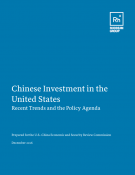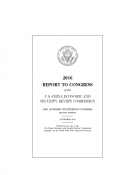×
Filter Results
Filter Results

Contracted Research
The report examines the rapidly increasing foreign direct investment by China in the United States and how the unprecedented level of investment, especially in sensitive sectors, raises new considerations for lawmakers regarding U.S. national and economic security. This report was prepared for the Commission by the Rhodium Group.

Annual Report
The U.S.-China Economic and Security Review Commission has released the 2016 Annual Report to Congress.
